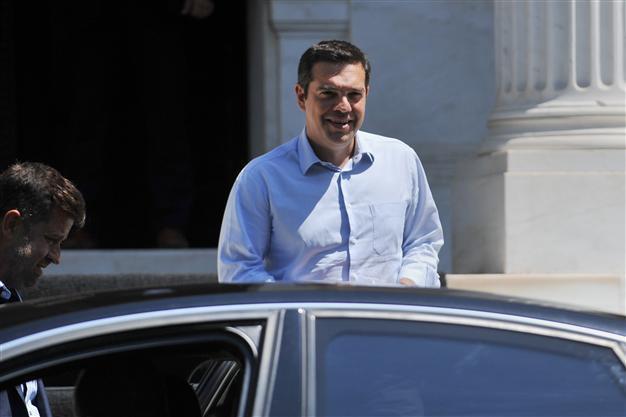Turkish poet’s verse quoted by Greek PM Tsipras in announcing resignation
ATHENS

Greek Prime Minister Alexis Tsipras leaves his office in Athens, on Thursday, Aug. 20, 2015. Giannis Kotsiaris/ InTime News via AP
Greece’s president has formally asked opposition leaders to form a new government after a party rebellion over a bailout deal forced Prime Minister Alexis Tsipras to call early elections next month.
But caught amid the hubbub of the resignation was an ode to Turkey’s most famous poet, Nazım Hikmet. “Our best days have yet to be lived,” Tsipras said in trying to provide hope for an uncertain future after his government was forced to accept punishing austerity measures for a third international bailout.
Tsipras said he secured the best deal possible when he agreed to a three-year, 86 billion-euro ($95 billion) bailout from other eurozone countries to save Greece from a disastrous exit from the euro currency.
“I wish to be fully frank with you. We did not achieve the agreement that we were hoping for before the January elections,” he said. “But [the agreement we have] was the best anyone could have achieved. We are obliged to observe this agreement, but at the same time we will do our utmost to minimize its negative consequences,” he said.
“Our best days have yet to be lived,” he said, quoting the left-wing poet Nazım.
It was a line from Nazım’s “Poems For Piraye (9 To 10 O’clock Poems)” written in 1945.
The poem was a long letter from the writer, who was a political prisoner at the time, to his love, Piraye. The line quoted by Tsipras is from the following part of the poem:
“The loveliest sea
is the sea not yet traveled
The loveliest child
is the child not yet born
Our loveliest days
are those we have not yet lived through.
And the loveliest word I would say to you
is the word that I have not yet said.”
Nazım voices his optimism for the future in the poem despite the harsh conditions of the time, linking his family’s fate to the world’s:
“People
will surely carry people
on to sunnier days
our son will get well
his father out of prison
your golden eyes
will fill with laughter once more...
Our fate
is the world’s fate.”
The final verses of the poem feature Nazım’s concerns and hopes:
“Damn, the winter has come down hard.
Who knows what’s happened to you
and to my honorable Istanbul.
Have you enough coal?
Can you get wood?
Stuff newspaper in the window cracks,
and go to bed early.
There’s nothing in the house to sell,
I know...
When we shiver
half hungry
half full
Even in this we are in the majority
in our country
in our city
in the world.”
